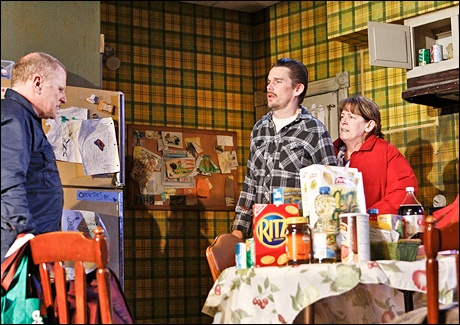
A dysfunctional Connecticut family lets loose in Tommy Nohilly’s BLOOD FROM A STONE (photo by Monique Carboni)
Acorn Theatre, Theatre Row
410 West 42nd St. between Ninth & Tenth Aves.
Through February 19, $61.25
212-239-6200
www.thenewgroup.org
Recalling the long line of such dysfunctional theatrical families as George, Martha, Nick, and Honey from Edward Albee’s WHO’S AFRAID OF VIRGINIA WOOLF? and the Tyrones from Eugene O’Neill’s LONG DAY’S JOURNEY INTO NIGHT, debut writer Tommy Nohilly’s BLOOD FROM A STONE is a flawed but compelling, none-too-subtle, extremely bleak production from the New Group. Nohilly, an actor living in Hell’s Kitchen, sets the play in a working-class home in suburban New Britain, Connecticut, around Christmastime earlier this decade. The prodigal slacker son, military vet Travis (Ethan Hawke), has come home for a few days before planning to take off to find himself out on the open road; ostensibly the voice of reason in the family, he is also a stand-in for the audience; unable to take action, he spends most of his time listening and watching, except when having a quick fling with his married high school sweetheart, Yvette (Daphne Rubin-Vega), who lives next door. Travis’s brother, Matt (Thomas Guiry), is considering leaving his wife and two children for a coworker who is married with four children, while sister Sarah (Natasha Lyonne), the person closest to “normal,” is pregnant again. But the stars of the show are their parents, Bill (Gordon Clapp) and Margaret (Ann Dowd), who are constantly at each other’s throats, screaming, yelling, and cursing, both filled with a hateful venom that feels all too real; this is not a couple that is about to kiss and make up under any circumstance, so don’t expect any Christmas miracles. Clapp is outstanding as Bill, a ticking time bomb ready to explode (or implode) at any moment, while Dowd chews up and spits out Derek McLane’s wonderfully vapid set design. Although Nohilly and director Scott Elliott tend to hit hard — the family’s severe dysfunction is mirrored by the house itself falling apart, with ceiling tiles crashing down as the roof leaks huge splashes of rainwater into the kitchen — there are also moments of great subtlety and tenderness, as when Bill and Travis reminisce over late-night ice-cream cones or Travis almost absent-mindedly massages his sister’s feet. In fact, dairy is a key aspect in the play, as milk, the nourishing substance of youth, is guzzled by several characters over the course of four very tense days. An actor’s writer, Nohilly has created numerous scenes in which the performers shine, although the women are too one-note (the playwright and director even go out of their way to have Rubin-Vega gratuitously run naked across the stage), and the play often feels like a series of vignettes instead of a smooth, continuous narrative, too jumpy and random. It’s also top heavy, with the too-long first act running around an hour and a half, followed by the too-short second act, which clocks in at about forty minutes. Still, there’s a lot to like about this intimate production, which also features fine special effects by Jeremy Chernick.